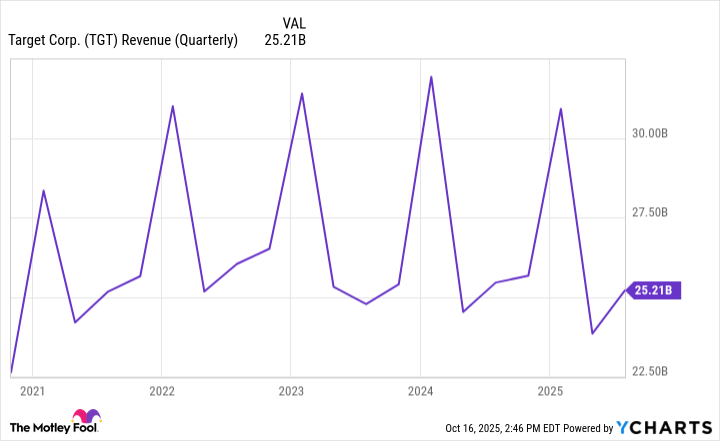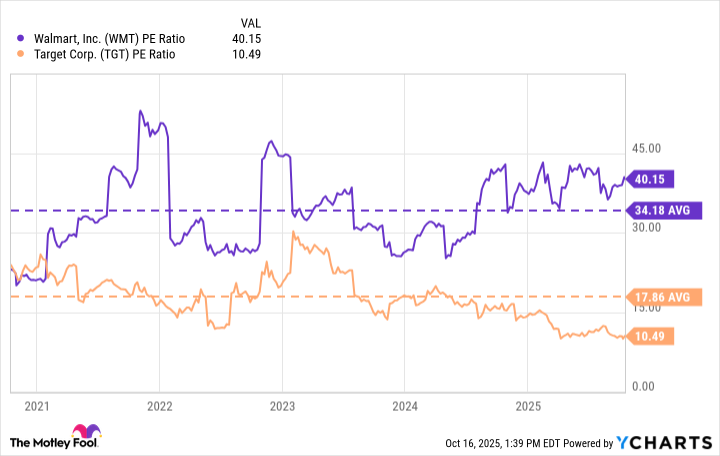Both Target (TGT +3.85%) and Walmart (WMT +4.14%) have been staples in the retail world for decades, having been around since 1902 and 1962, respectively. They have established, recognizable brands, and their businesses have stood the test of time.
However, so far this year, their stocks have been on totally different trajectories. Target's stock is down almost 35% this year (through Oct. 16), while Walmart's stock is up around 18% and flirting with its all-time high.
Both stocks have good things working in their favor from a business perspective, but if you're interested in investing in one of the companies, one sticks out as the better option right now.

Image source: Getty Images.
What Target has working in its favor
While Walmart has always prioritized keeping its prices low (its previous slogan was "Always Low Prices"), Target has positioned itself as a more premium brand that customers can go to for exclusive brands and products that may not be found in other general retail stores.
Looking past product sales, Target has been showing growth in areas such as its memberships (Target Circle 360), marketplace (Target Plus), and Roundel (its advertising platform for the brands it sells). In the second quarter, Target's revenue decreased 0.9% year over year, but those three areas grew revenue by 14.2%.

TGT Revenue (Quarterly) data by YCharts.
Target's stock stands out as the better option for income investors because its dividend remains one of the most reliable in the stock market. It's a Dividend King (a company with at least 50 consecutive years of dividend increases), with 54 consecutive years of dividend increases under its belt.
Walmart is also a Dividend King, but Target's 5% dividend yield is far higher than Walmart's 0.8%. Although Target's dividend yield is only that high because of its recent stock price struggles, it's a good incentive for investors while the company tries to get back on track. With a new CEO at the helm, maybe that could be the spark the company needs.

NYSE: TGT
Key Data Points
What Walmart has working in its favor
Walmart's retail business is fairly straightforward, but the company has been making efforts to expand into much higher-margin businesses like membership (Walmart+), advertising (Walmart Connect), and e-commerce.
Walmart has many more physical stores than Target, giving it a footprint that no other retailer can compete with in America (around 4,600 stores in the U.S. and 10,750 globally). This has been key in growing its Walmart+ membership numbers because one of its main selling points is same-day delivery.
Whereas a company like Amazon has dedicated fulfillment centers, Walmart can use its stores as fulfillment centers because around 93% of Americans live within a reasonable distance of a store. That adds to the convenience factor that the company is pushing to attract and retain customers.
Walmart has always been a cash cow ($177.4 billion in revenue in its fiscal second quarter), but focusing on recurring revenue and high-margin businesses should improve the company's overall margins and leave more cash available to make necessary investments for growth.

NASDAQ: WMT
Key Data Points
So, should you invest in Target or Walmart?
One thing working in Target's favor is that it's trading much cheaper compared to Walmart. At the time of this writing, Target is trading at close to 10.5 times its projected earnings over the next 12 months, while Walmart is trading around 40.1 times. Target's is well below its average for the past five years, while Walmart's is well above its average in that time.

WMT PE Ratio data by YCharts.
That said, being cheaper doesn't make Target the better option, especially considering that Wall Street analysts expect its revenue and earnings per share (EPS) to decline in the near term. On the other hand, all signs point to Walmart growing its revenue and EPS.
Financials aside, Walmart's business still seems better positioned than Target's. It has stronger momentum, and its emphasis on providing low-cost products and services likely means it's better suited to thrive through whatever economic conditions it may face. When money is tight for consumers, Walmart is a great go-to stock; when consumers have more disposable income, it's still a great go-to.
Walmart's stock isn't cheap by most standards, but that shouldn't deter investors looking for a stock that can be a long-term staple in their portfolio.





